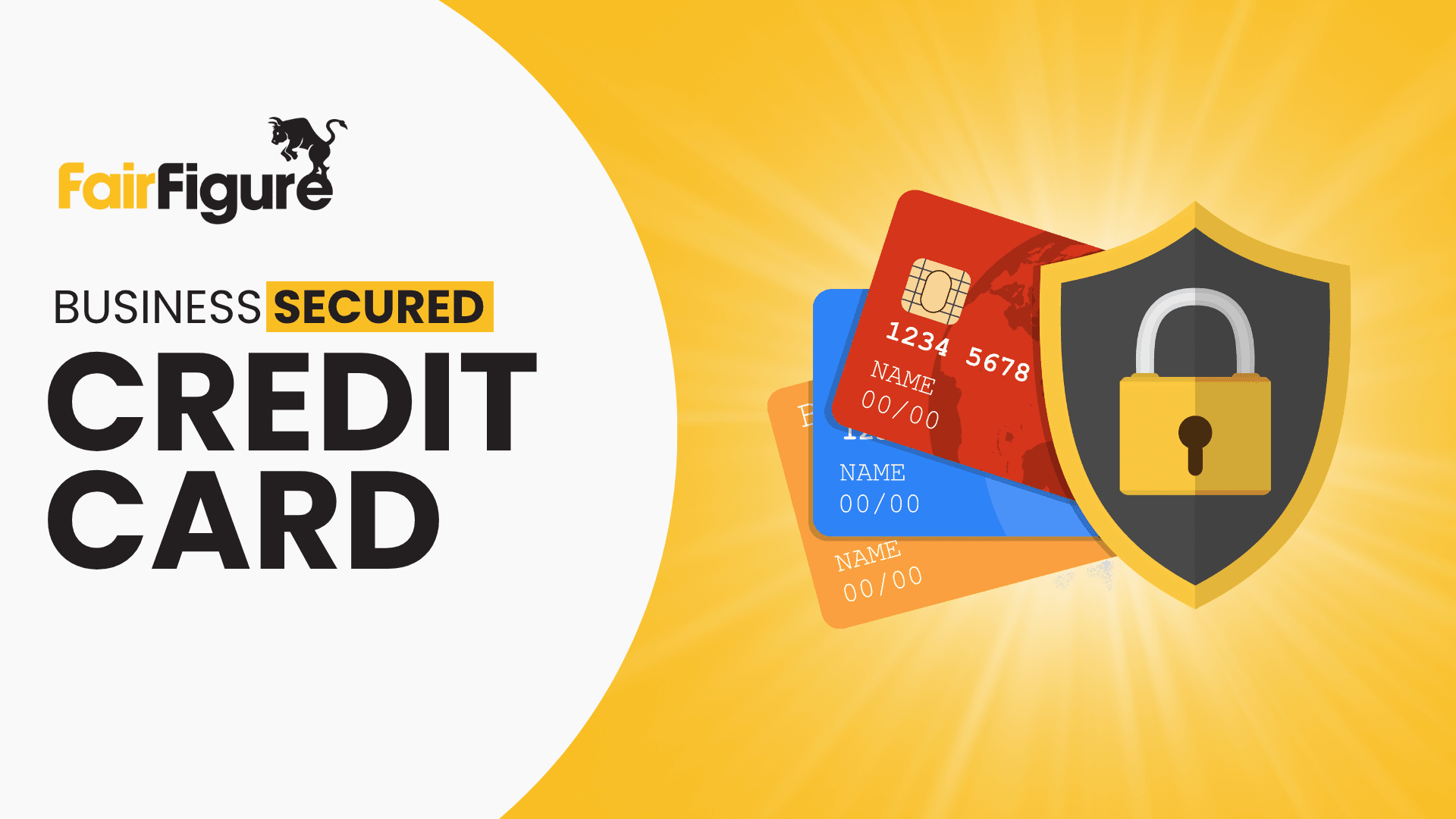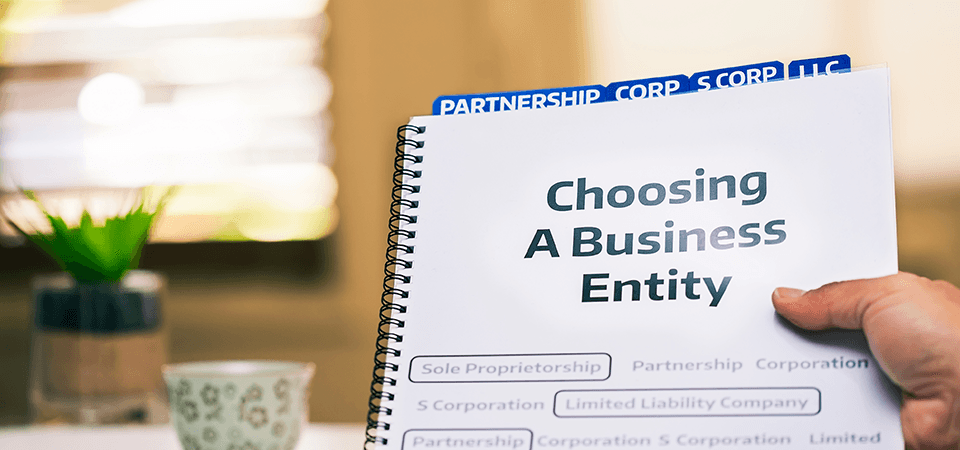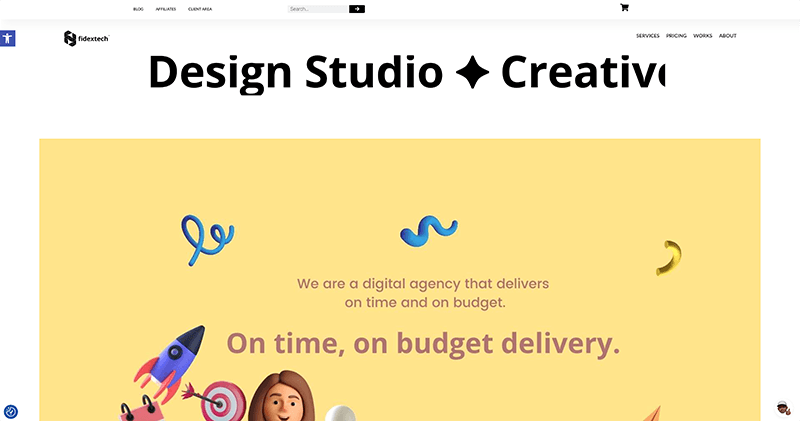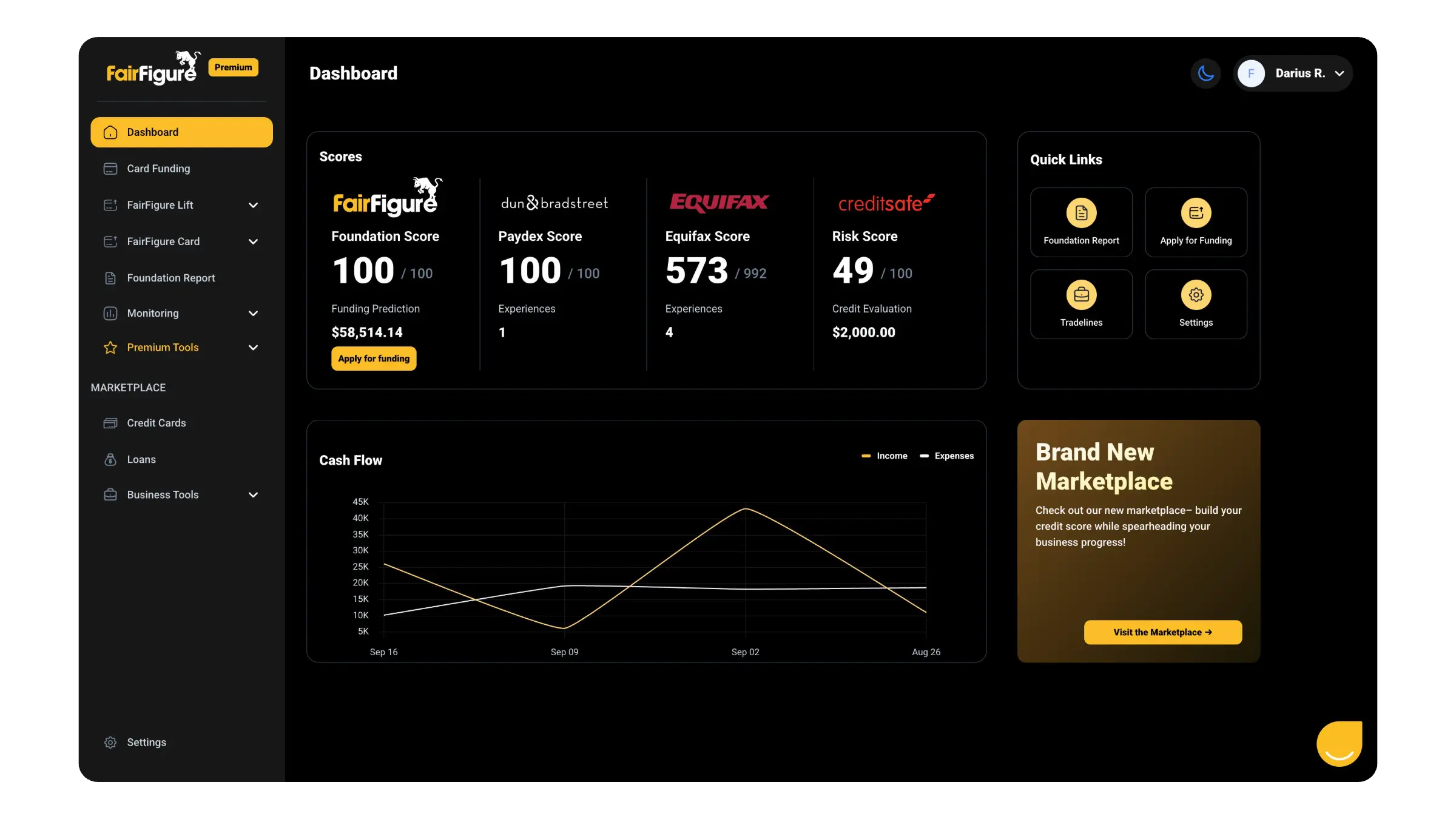Is a Business Secured Credit Card a Good Idea?
Author: Dylan Buckley
January 23, 2026
10 min read
TABLE OF CONTENTS
- 1. How Secured Business Credit Cards Work
- 2. Why Getting a Secured Business Credit Card Is a Bad Idea
- 3. The Security Deposit Is Expensive
- 4. They Do Not Usually Report to All 3 of the Main Business Credit Bureaus
- 5. There Are Not Very Many of Them
- 6. How to Build Business Credit without a Secured Credit Card
- 7. Get a FairFigure Account
- 8. Leverage Your Personal Credit If It's Good

Start your credit building journey for your business

A business secured credit card might seem like a simple way to build business credit. In reality? Secured business credit cards are a bad deal for small business owners.
We explain why and explore many alternatives that are better for small businesses.
How Secured Business Credit Cards Work
A secured business credit card is a card that requires a refundable deposit.
You apply for the card, then you deposit an amount equal to your desired credit limit.
So, for example, if you wanted to access $2,500 in funding monthly, you would put down a $2,500 deposit.
Secured business credit cards are often sought out by small business owners because they’re less difficult to qualify for. If you manage your debt correctly, you can receive your deposit back and potentially raise your credit limit over time.
At face value, a secured business credit card seems like a solid option for building business credit. It’s easy to qualify for. It allows you to potentially get your money back, raise your credit line, and seemingly build credit.
What business owners don’t know about are the numerous disadvantages accompanying these cards.
Why Getting a Secured Business Credit Card Is a Bad Idea
1. The Security Deposit Is Expensive
Arguably, one of the most well-known (and one of the few) secured business credit cards out there is the Business Advantage Unlimited Cash Rewards Secured Business Credit Card.
The BoA secured card doesn’t give you the option to choose a low security deposit. You can’t open a card for a few hundred dollars.
Rather, you have to adhere to the minimum $1,000 security deposit. For small business owners hoping to build credit and access funding, this is a sizable cost, all to get the same credit limit that they’ll then use to fund their business.
Of course, expenses for this secured business card don’t stop there. While the BoA secured card doesn’t have an annual fee, it does have a 27.49% variable APR. This is a high APR you don’t want to get saddled with as you try to build your business.
If you were to shift over debt for any reason, you’d be looking at a 4% balance transfer fee.
Overall, it costs to obtain a secured card. At the beginning, you’re trying to keep your expenses to a minimum. Taking on a security deposit of $1,000 or more, as well as high interest rates, isn’t ideal.
2. They Do Not Usually Report to All 3 of the Main Business Credit Bureaus
The whole point of signing up for a business credit card is to build credit. You need your credit score to go up so you can access better solutions. You want secured business credit cards that report to D&B, Equifax, Experian, and other business credit bureaus.
Let’s continue with the above business card example. At first glance, it looks like products like the BoA secured card will help you do that. After all, they report to the SBFE.
The SBFE should report data to major credit bureaus. When you have a credit issuer who uses the SBFE, you expect your D&B, Experian, and Equifax credit history to develop and your business credit score to go up.
However, that’s not always the case. Most payments don’t end up on your Dun & Bradstreet, Equifax, or Experian reports. All you’re doing is essentially paying to access a credit solution that doesn’t achieve its primary purpose.
Your credit history won’t be established, and your credit score won’t go up.
3. There Are Not Very Many of Them
The biggest issue that small businesses run into is a lack of options.
If you want an unsecured business credit card, there are an abundance of them. You can sign up for a business credit card at nearly every major bank and credit union. This gives you the freedom of choice and the ability to select the best terms.
The same can’t be said about secured credit cards. Very few banks and credit unions actually offer secured credit cards for businesses. Some guides online will even direct you to secured consumer cards because the number of secured business credit cards is so low. (We wrote a guide on this: What Secured Credit Card Builds Credit the Fastest?)
We have the BoA option mentioned above. Then, we have a few other options, such as the First National Bank Business Edition Secured Visa Card and the Valley Bank Visa Secured Business Credit Card.
Some of them have lower security deposit minimums, but the drawbacks like high fees, high APR, and little in rewards tend to remain the same across the board.
Put simply, you’d be better off looking into credit solutions that give you more flexibility in terms of options and better terms.
You can build your business credit without a secured credit card.
How to Build Business Credit without a Secured Credit Card
There are many ways to build business credit without a secured credit card.
These include using credit-building solutions designed specifically around your needs, leveraging your personal credit to obtain an unsecured credit card, reporting your bills, and reporting net 30 payments.
We’ll go into each option in greater detail below.
Get a FairFigure Account
A FairFigure account helps you build business credit by offering you two business tradelines. With FairFigure, you receive one vendor tradeline and one financial tradeline.
How? The first solution FairFigure offers is its business credit monitoring service. This service costs $30 a month. By paying the subscription, you have each of your payments reported to D&B, Equifax, Creditsafe, the SBFE, and FairFigure’s own Foundation Report.
The second tradeline it offers comes in the form of the FairFigure Capital Card. This is useful if you’re looking for a business credit card EIN only.
The FairFigure Capital Card offers funding based on your recurring monthly revenue. If you earn at least $2,500/month and have been in business for at least three months, you could qualify.

Better yet, there’s no security deposit required. It’s an EIN-only card with no personal guarantee, no personal credit check, and no paperwork. It’s reported to all of the same business credit bureaus listed above.
In short, it offers all of the benefits a secured business credit card should offer with none of the drawbacks.
Sign up for FairFigure today to build your business credit and access funding!
Leverage Your Personal Credit If It's Good
If you sign up for an unsecured business credit card, you’re almost always going to need to rely on your personal credit. This is a given.
But that doesn’t always mean it’s a bad thing. If you have good personal credit, getting an unsecured business credit card is possible.
That being said, there are a few things to make sure of when you’re applying.
The first is that it reports to the three major business credit bureaus. If you are going to sign up for a business credit card, it has to help you build credit. If you can’t get all three, at least make sure it’s reporting to a major business credit bureau.
The second thing is that it doesn’t report to personal credit bureaus. A surprising number of banks will report to personal credit bureaus. It is worth mentioning that not all activity may be reported, however. They may only report negative activity on your unsecured card.
You might consider Amex, for example, if you want a card that won’t impact your personal credit. On the other hand, Citi generally reports, but they have a few card options that don’t report any transactions to personal credit bureaus.
Take care to ask your card issuer more about their reporting practices. This will guarantee you’re getting a card that will boost your business credit score and help you build business credit history without impacting your personal credit.
If you’re looking for alternatives, you can always look to startup business credit cards with no credit EIN only.
Report Business Bills with eCredable
Another way to build business credit is with the support of eCredable.
eCredable is a credit-building company that offers two subscription plans: Business Lift and Business Lift+.
Both subscriptions help you build credit by reporting your subscription payments. eCredable reports your monthly payments to D&B, Equifax, and Experian.
Where it truly makes an impact is with its third-party bill reporting practices.
Normally, most of your business bills serve one purpose: to keep your business running. But what if you could use them to build credit?
eCredable makes this possible by helping you report eligible business expenses to Equifax. Whether you’re able to report your phone payments, your lease payments, or your business insurance, they’ll help make it happen.
The basic plan offers monthly reporting and third-party bill reporting support. The Business Lift+ plan offers all of this alongside additional financial insights and analytics.
Report Net 30 Account Payments
Do you currently have any credit accounts with vendors? Vendor credit is the easiest type of credit to qualify for. If you’re a new small business owner, it’s one of the credit solutions you’re going to turn to first.
Net 30 vendors help build business credit by extending net 30 terms. Basically, you apply for an account, select the “buy now, pay later” option, then pay your invoice on time or in advance.
Tier 1 business credit vendors are quite easy to qualify for. So long as you have a U.S.-based business, have been around for at least a few months, have no negative payment history, and have an EIN, you will get approved for most accounts.
As with unsecured business credit cards, there are a few catches.
- Account Costs: Some net 30 accounts cost you nothing to open or use. Others come with account opening fees, annual fees, and beyond. It might be worth it to pay for some if you plan on using them frequently. However, many are free to use.
- Reporting Practices: Some net 30 accounts will report to one, two, or even three business credit bureaus. Others don’t report at all. Review their terms to ensure you’ll build business credit with them.
- Initial Usage: Some net 30 accounts have prerequisites you must meet before you can use net 30 terms. This might mean paying a certain percentage of your first order upfront. Take care to see if these apply to you before you utilize net 30 terms.
- Must Use Regularly: You have to use your net 30 account regularly to keep it open. Sign up with businesses you will regularly purchase items from. Otherwise, you can end up losing access and failing to build business credit.
Having multiple tradelines will help you build business credit rapidly. There are many ways to build business credit without using a secured business credit card.
More articles
Read More >
January 23, 2026
5 min read

January 23, 2026
5 min read

January 23, 2026
3 min read

Start your credit building journey for your business

Start your credit journey now with FairFigure